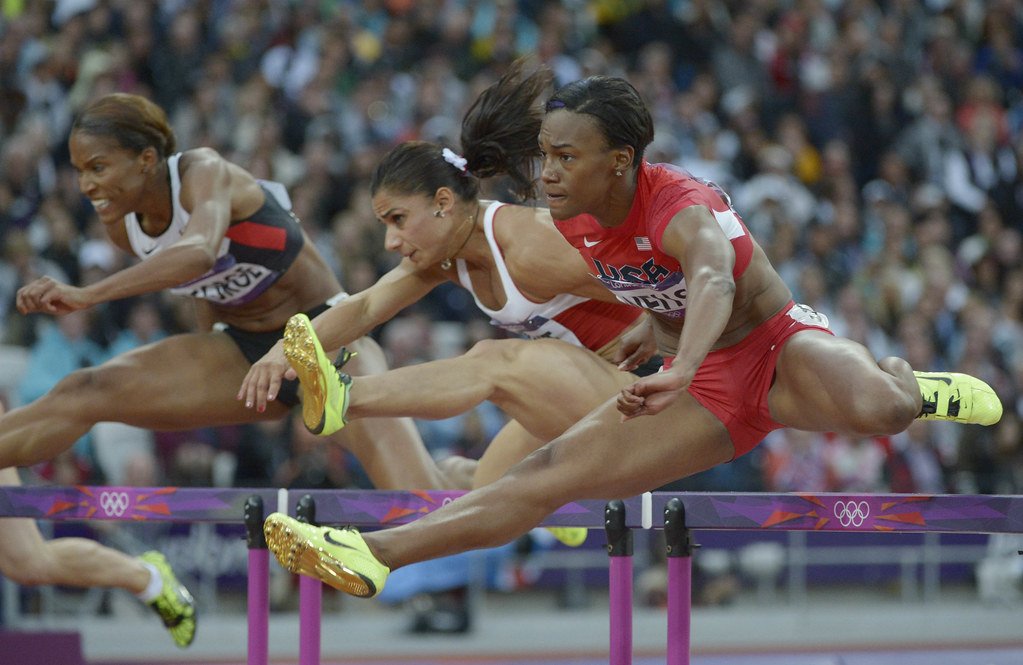Photo courtesy of Kirby Lee via Flickr.
Baya Jaiswal ’27
Staff Writer
Nike recently unveiled the Team USA uniforms for the 2024 Paris Olympics at a Nike Air event in Paris, Business Insider reported. The women’s track & field bodysuit, in particular, sparked widespread discourse and evoked cries of sexism within the sporting world.
While the men’s bodysuit consisted of a mid-thigh length pair of shorts and a compression tank top, the women’s red, white and blue bodysuit was trimmed particularly high on the hip, revealing more skin.
Many athletes joked about needing a waxing session to wear the bodysuit. Queen Harrison-Claye, an American sprinter and hurdler who competed in the 2008 Summer Olympics, commented, “Hi @europeanwax would you like to sponsor Team USA for the upcoming Olympic Games!? Please and thanks.”
Others questioned the feasibility of wearing the outfit during activities like running, vaulting or hurdling without risking a significant wardrobe mishap. While Nike did not directly address concerns about the controversial bodysuit, their chief innovation officer, John Hoke III, noted that the bodysuit for women and the shorts and top for men represent just a few of the choices Nike will offer its Olympic runners.
Hoke told the New York Times that there are “nearly 50 unique pieces across men’s and women’s and a dozen competition styles fine-tuned for specific events.”
Lauren Fleshman, a former runner and the author of “Good for a Girl: A Woman Running in a Man’s World,” expressed her disagreement with the company’s decision to showcase the revealing women’s suit alongside the more conservative men’s suit, rather than presenting two comparable options.
“Why are we presenting this sexualized outfit as the standard of excellence…? In part, because we think that's what nets us the most financial gain from sponsors or NIL opportunities, most of which are handed out by powerful men or people looking at it through a male gaze,” Fleshman told The New York Times.
“There’s always this feeling that our value is in our bodies versus the performing that our bodies do,” Harrison-Claye told Business Insider.
This is not the first time that the expectations surrounding sports attire for female athletes have sparked controversy. In 2021, the Norwegian women’s beach handball team was fined 1,500 Euros for “improper clothing,” according to a statement from the European Handball Association’s Disciplinary Commission. The Norwegian women’s team refused to compete in bikini bottoms in their bronze medal match against Spain in the Euro 2021 tournament, competing in thigh-length shorts instead, NBC News reported.
As NBC News reported, International Handball Federation regulations stipulate male players can wear tank tops and shorts not exceeding 4 inches above the knee, while female athletes are mandated to wear midriff-baring tops and bikini bottoms having “a close fit and cut on an upward angle.” The Norwegian team hoped to critique the double standards set for female athletes by wearing uniforms with more coverage.
Associate Professor of Sociology at Western University in Canada Janice Forsyth noted that specific uniforms, particularly in track & field and swimming, might offer athletes some advantages, The New York Times reported. However, when it comes to a sport like beach handball, she explained that opting for shorts would not limit athletes’ ability to perform well.
“I don’t see how that argument holds any weight,” Forsyth told The New York Times. “To say that wearing less clothing, as the women are required to do, allows them to be better athletes is just silly.”
According to The New York Times, the International Handball Federation revised its regulations so that female athletes are no longer forced to compete in bikini bottoms. While this is a significant step in fostering greater gender equality within the sporting arena, there is a long way to go. An effective response and reform to Nike’s bodysuit for the 2024 Olympics may set a new international precedent in women’s sports.

